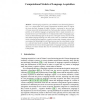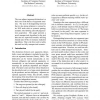180 search results - page 1 / 36 » A Computational Model of Early Argument Structure Acquisitio... |
COGSCI
2008
13 years 4 months ago
2008
How children go about learning the general regularities that govern language, as well as keeping track of the exceptions to them, remains one of the challenging open questions in ...
CICLING
2010
Springer
13 years 11 months ago
2010
Springer
Abstract. Child language acquisition, one of Nature’s most fascinating phenomena, is to a large extent still a puzzle. Experimental evidence seems to support the view that early ...
ACL
2010
13 years 2 months ago
2010
The core-adjunct argument distinction is a basic one in the theory of argument structure. The task of distinguishing between the two has strong relations to various basic NLP task...
BIRTHDAY
2009
Springer
13 years 11 months ago
2009
Springer
We propose to model the development of language by a series of formal grammars, accounting for the linguistic capacity of children at the very early stages of mastering language. T...
AUSAI
2005
Springer
13 years 10 months ago
2005
Springer
In this paper we present several efficient computational procedures for defeasible reasoning while the plausible and well-defined semantics, viz. preferred models and stable mode...


